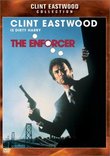Dirty Harry
|
|
DirtyHarry.JPG
- For the 1953 nuclear test nicknamed "Dirty Harry", see Upshot-Knothole Harry [1] (http://www.ratical.org/radiation/KillingOurOwn/KOO3.html)
Dirty Harry is a 1971 film directed by Don Siegel and starring Clint Eastwood as the eponymous Harry Callahan, a San Francisco detective tracking Scorpio, a serial killer. Eastwood's iconic performance the blunt-speaking, unorthodox detective set the style for a number of his subsequent roles, and the box-office success of the film led to the production of four sequels. The "alienated cop" motif was one subsequently imitated by a number of other films.
The title role was originally intended for Frank Sinatra, but after he injured his hand in an accident, it was offered to John Wayne, Steve McQueen, and Paul Newman. It was finally accepted by Clint Eastwood.
The Scorpio Killer, the film's antagonist (a confident psychopathic killer) was based on the real-life Zodiac killer, who was killing people in San Francisco at that time. The Zodiac has never been caught. Audie Murphy was first approached to play the Scorpio Killer, but he died in a plane crash before his decision on the offer could be made. The part went to actor Andrew Robinson, whose portrayal was so chilling that after the film was released he reportedly received several death-threats and was forced to get an unlisted telephone number.
It would be revealed that the fictional portrayal of the Scorpio killer in the film was in fact, a deranged Vietnam veteran who has been discharged under Section Eight. Another fact is that the character might be modeled after a real-life G.I. discharged because of sexual orientation - some would suggest the fictional Scorpio killer is openly gay.
The movie is popularly credited for being responsible for the famous line: "Do you feel lucky, punk?", although this is in fact a misquote. The actual quote from the beginning of the movie follows (the lines in the climatic scene were slightly different). To set it up, after quite a few shots have been fired, Dirty Harry is holding his .44 Magnum and standing over a criminal. The criminal's gun is but inches from his hand. Does he grab it, or ...
- "Ah Ah, I know what you're thinking. 'Did he fire six shots or only five?' Well, to tell you the truth, in all this excitement I've kinda lost track myself. But being this is a .44 Magnum, the most powerful handgun in the world, and would blow your head clean off, you've got to ask yourself one question: 'Do I feel lucky?' Well, do ya, punk?"
The final scene where Harry throws his badge in the river is a homage to a similiar scene from 1952s' High Noon.
Sequels
There were four sequels to the film:
Magnumforce.JPG
Magnum Force, directed by Ted Post. The main theme of this film is vigilante justice, and the plot revolves around the killings of criminals who have avoided conviction in court by renegade cops. By contrast, for all of Harry's strongarm methods, he does not tolerate coldblooded murder of the accused and resolves to stop the killers. It is generally considered the second best in the series.
The Enforcer, directed by James Fargo. In this film, Harry is teamed up with a female partner (Tyne Daly), and takes on a terrorist ring. The film contains themes of feminism and political correctness. Fans of the series hold this to be a weak, overly silly entry, but more casual viewers seem to like it better.
Suddenimpact.JPG
Sudden Impact, directed by Clint Eastwood. This film's plot revolves around Harry being sent to a small town to follow up a lead in a murder case. It is best known for the phrase "Go ahead, make my day" (which is often incorrectly attributed to the first film), and usually considered a better film than The Enforcer.
Thedeadpool.JPG
The Dead Pool (1988), directed by Buddy Van Horn. In the final film in the series, Harry finds out about a game called The Dead Pool, in which people bet on which celebrity will die first. Eventually, someone tries to rig the game by killing certain celebrities. Universally regarded as the worst in the series, and proved a severe financial and critical flop upon release.

